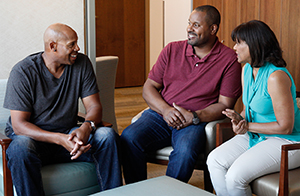Resources for People with Diabetes
Having diabetes means many life changes. These changes may seem overwhelming. That’s a normal feeling. When you feel down, reach out to your family and friends. Your healthcare team is also there when you have questions or need advice.

How to help yourself
These tips can help you care for yourself:
-
Do things that you like. See a favorite movie. Read a good book. Or listen to music.
-
Call a friend to chat.
-
Aim for 7 to 8 hours of sleep each night.
-
Take a walk or garden. Physical activity can ease stress and lift your mood.
-
Break your goals into small, manageable steps.
-
Stick to your treatment program. Keeping your blood sugar in your target range will help you feel better. If you like technology, ask your healthcare team about newer ways of keeping track of your blood sugar and other areas of diabetes management.
-
If you feel your plan isn't working, is too hard to do, or is too costly, talk with your healthcare providers.
How to get help from others
These tips can help you get help:
-
Talk to your friends and family about how you feel. Give them information to help them learn more about diabetes.
-
Bring someone with you to your next appointment. This will help them learn how to support you. Write down questions before so all your concerns are addressed.
-
Join a diabetes support group. Here you can talk to others with diabetes and share concerns, experiences, and tips for solving problems. Your healthcare team, library, community center, church group, senior center, or hospital may know about support groups near you.
-
Try an online support group. The American Diabetes Association (ADA) offers one. It can also help you find local ADA chapters.
To learn more
These organizations provide information, educational programs, and other services. They are there to help you.
Note
Talk with your healthcare provider if you feel helpless or hopeless, aren't interested in your usual activities, or have trouble sleeping or eating. These may be symptoms of depression. This serious condition can be treated.
© 2000-2024 The StayWell Company, LLC. All rights reserved. This information is not intended as a substitute for professional medical care. Always follow your healthcare professional's instructions.